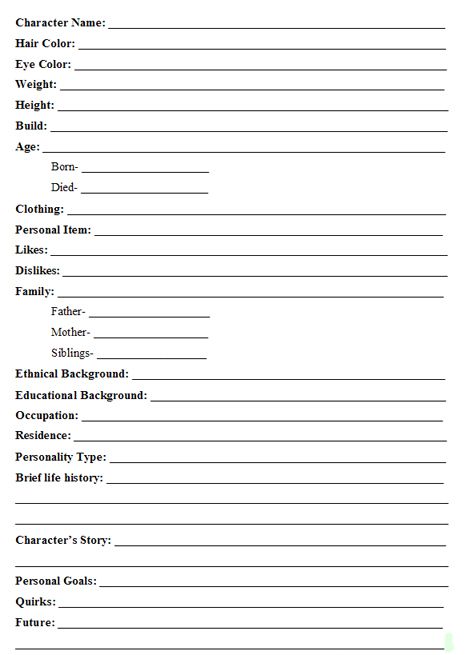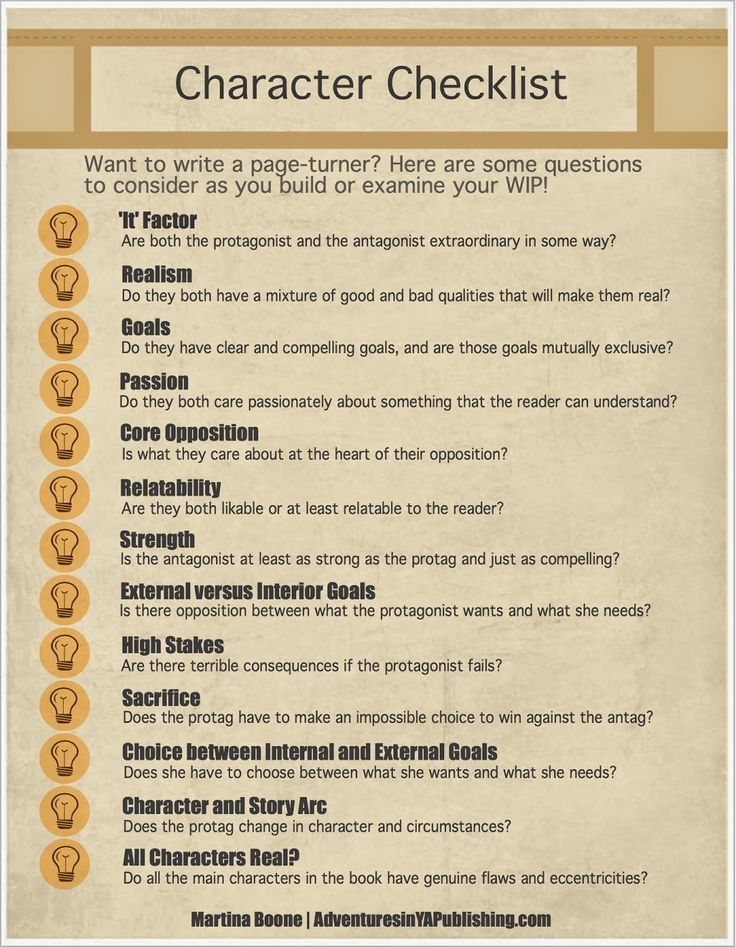Who are my characters and what is their journey? Hopefully this page will help you discover those details about your characters and develop them to their full potential!






Character Development Worksheets
- Give them a goal. A strong goal not only gives your character purpose, it helps you map out your plot with ease.
- Give them a motivation. Something is driving your character to chase down their goal. It could be a negative emotion like fear, guilt, or regret; a negative trait like pride, vanity, or greed; or a positive emotion like love, determination, or passion. Whatever the case, giving your character a motivation will make the actions they take to achieve their goal seem realistic and relatable.
- Give them purpose. Consider how your character adds to the story. Do they create conflict or undergo emotional development? If not, your character will seem pointless.
- Give them a fear. Fear is an emotion that all humans feel. It leads to insecurity, impatience, and conflict, which is why fear is the perfect emotion to include in your story. It both hooks readers and drives the plot forward. Just don’t let your characters cower in fear for long; make sure that they take action, too.
- Give them a flaw. Perfection is boring. Imperfection is human. Write a human story by giving your character flaws. Go beyond the physical and give your character a poor personality trait, bad standing in society, or an unpleasant circumstance to live in.
- Give them a history. Allow your character’s past to shape who they become. Give your character a rich history that will affect their present-day decisions.
- Give them a present story. Don’t drown your novel in backstory. Give your character a present-day story, a quest or a journey that will shape and grow them.
- Give them a personality. Don’t let your character have a dull, flat personality. Make your character complex by giving them contradictory traits and avoiding clichés at all costs.
- Give them interests. A character that doesn’t like anything simply isn’t interesting. Give your character a passion, even if it’s one your readers will hate. Fervor breeds interest, no matter the subject.
- Give them a quirk. Everyone has their strange habits. And strange is just as interesting as passionate. Give your character a quirk to help them stand out from the crowd.
- Give them a name. More specifically, give your character a name with purpose. Showcase a time period, foreshadow their actions, or hint at their interests. Give your character’s name a role in your story.
- Give them a desire. Desires are powerful motivators. Some desires may lead your character to accomplish their goal while others may lead your character away.
- Give them a love. How can your readers love your character if your character loves no one? Your character doesn’t have to be all hugs and smiles, but they do need to hold love for at least one person if you want your readers to like them.
- Make them complex. The best characters are those whose actions always surprise readers. Create a character with a complex personality and motivations, then reveal each layer one by one.
- Make them unique. Don’t let your character become just another average Joe. Make them stand out from the rest by giving them a unique goal, motivation, or trait.
- Make them intelligent. Stupid characters aren’t exciting. It’s as simple as that. You need a character that can stand up to your story’s villain, one whose intelligent and intuition prove to be a powerful force.
- Make them relatable. If your character is stone-cold, readers will never be able to relate to them. Give your character at least one personality trait, situation, or motivation that readers can connect with on a personal level.
- Make them fail. If your character succeeds in everything, then there was never much of a plot to your story. Your character needs to face setbacks, to get discouraged and overwhelmed, and sometimes to even fail outright. It is their failure that will make the victory all the sweeter.
- Make them suffer. Readers need to see who your character is at their worst so that they can love them at their best. That means that you need to be a cruel author and make your character suffer. It’s not always easy (though sometimes it can be fun), but it is necessary to take your character through the fire so they can become a stronger person.
- Make them sweat. Your character’s success shouldn’t be handed to them on a silver platter. In order to make your character’s goal worthwhile, you need to make them work for it. Night and day. Blood and sweat and tears. They need to fight in order to win.
- Find their gender. In most cases, your character’s gender matters less than you would think. Just because you had a male protagonist in mind doesn’t mean that they would be the best choice for your novel, or vice versa. Take the time to consider everything your character will go through. Which gender would realistically be able to tell that story best?
- Find their perspective. Everyone has a different perspective on life. Your character’s upbringing, religion, morality, beliefs, and social influences will shape how they see the world. Take the time to flesh out each element so that readers can become fully enveloped in your character’s perspective.
- Find their type. Is your character introverted or extroverted? Shy or outgoing? Adventurous or content? Think about all of the many roles your character can play. Who are they truly? Do they show their true selves to the world, or do they put on another face in a public atmosphere?
- Find their language. People speak differently depending on where and how they were raised. Does your character speak with a certain dialect or have an accent? Also, consider whether or not they use slang words, trendy jargon, or proper grammar.
- Find their attitude. Your character’s attitude is deeply linked to their perspective. The way in which they were raised and what they now believe will dictate how your character acts. Are they optimistic, pessimistic, or realistic? Consider if they treat others will respect and compassion or if selfishness or hatred runs deep in their veins.
- Find their happy place. Everyone has a place that they can go to in order to feel comfortable and relaxed, where they can truly be themselves. Discover this place for your character, and then take them there. Readers need to see who your character is in their purest form.
- Find their support. Your character is going to go through some tough situations. They’ll need others by their side to love, encourage, and guide them. Discover who these characters are, and then bring them onto the scene.
- Find their gut. Everyone has gut feelings and gut reactions. Get to know these for your character. Even if they don’t follow them, relating your character’s gut in the narrative can help you reveal more about your character, create tension and suspense, and foreshadow upcoming events.
- Find their bane. Everyone has a breaking point. Your readers need to see what this is to better understand who they are reading about. It is this bane that will cause them to suffer, and that suffering will reveal who they really are.
- Find their refuge. Your character will need a safe haven from time to time, someone or someplace that will make them feel safe and secure. Find this person or place for your character so that they can receive the respite they need to recharge for your story’s climax.
- Find their redemption. Your character will screw up. They will be forced to make decisions that will harm other people. Sometimes, they’ll even harm or offend others purposefully. It’s your job to give them the redemption they need to become a likable character. How will they be humbled? How will they fix their mistakes?
- Find their glory. Your character has grown and developed throughout their journey. In all likelihood, they have become a better person. Give your character a glimpse of how far they have come, and allow them to revel in it.
- Find their story. At the end of the day, your character cannot be summed up in 32 individual statements. Reading over your notes won’t bring your character to life. What you truly need to know in order to make your character shine is their story.
Who were they in the beginning? What happened to them? What mistakes did they make and trials did they face? What did they do when they reached their breaking point? What realizations did they make, and how were they motivated to continue on? What did their fight look like? How did they overcome? And who are they now because of it all?
That is your character’s story. That is your character.


